- Home
- Marie Rutkoski
The Hollow Heart Page 9
The Hollow Heart Read online
Page 9
“And you.”
“That is not all you pray for.”
My mother, that she may live.
Nirrim.
Prayers are private. I make them less because I believe the gods listen than because praying helps me feel more like a true Herrani. And it is no bad thing, to concentrate a wish in your heart.
I wish I could see Nirrim again. I wish for her skin against mine. I wish for her bravery, her compassion.
I wish she had chosen me, as I chose her.
“May the gods love us all.” I wonder which god I have offended. Which one watched me to set sail to Herrath, and placed Nirrim in my path?
“May they love us all,” Emmah echoes. She kisses my forehead and bids me to sleep well.
I cannot. After she leaves, the wax drips, the flames sputter and lower. The oil in my table lamp burns out, leaving a heavy, slick scent in the air. There is no light but the candle flames and their reflections. One hisses, and then the other, and I am left alone in the dark.
Of all the people in Herran, one might resent my mother most.
I push open a window. The night is dense. Warm and sticky. Sweet, too, with the scent of white, night-blooming flowers that have opened their faces to the moon. The night holds summer’s end: the honey left at the bottom of an almost-empty jar.
I pass into my dressing room, where I leave my gun and dagger on the table and shuck my tunic and trousers. Because I believe he will be more likely to speak with me in a dress, I select the first my gaze falls upon. If I must wear a dress, I don’t want to agonize over which one will feel less terrible.
The moment I am in it, I no longer feel like myself. I feel like a ribbon marking a page in a book about someone else. The dress—a lilac, lutestring silk affair that makes me sweat—swishes as I hunt for slippers. Practically a living thing, crawling all over me, the dress keeps getting in my way. It gathers awkwardly between my legs and slips under my bare feet so that I stumble. Its hem is too long without heeled shoes.
Yet all such shoes in my wardrobe are stiff, new, never worn. I swear that even more have been added in my absence. That will have been the doing of either Sarsine, who likes me to look “proper,” or Emmah, who sometimes commissions new garments and accessories fit for a lady, so that Sarsine will not pester me. Then Emmah stuffs them away to be forgotten. As soon as I see these slippers, I know they will cut my feet, even with stockings.
Stockings!
No. I have my limits.
I reach again for my favorite boots. After all, the dress is long. Maybe he will not notice the boots.
I lace them. I belt my dagger around my narrow hips. In the mirror, I could be a colonial Valorian girl: my eyes large and dark, my short hair the perfect golden color, even if it should be twined in braids as long as snakes. It is the right look—or close enough—to encourage him to want to speak with me. He does not always.
I take gold, to bribe the guards, and slip out of my quiet home to visit the prison that holds Herran’s most reviled criminal.
* * *
The god of the moon is not mine, but sometimes I think that mercurial god loves me. The moon’s fullness casts a pure light, and it is no trouble to make my way across the lawn to the stables and saddle a horse.
Javelin whickers at me hopefully, but I would never risk riding him. The warhorse has bony withers and is prone to saddle sores. His face, gone gray, looms over the stall gate. He likes winter apples, and every season my mother stores some for him, her expression more anxious with each year. Javelin has already lived longer than any horse should. I stroke his nose and the hollows above his eyes. He whuffs, disappointed in my lack of apples, disappointed in me. Whenever he sees me, he looks for my mother.
I saddle a roan mare. Doesn’t matter what her name is. She will answer to whatever I call her.
I never put my heart into a horse like my mother did. Javelin was the best, and he was hers. When I was little, all I wanted was for him to be mine, too. By the time I grew old enough to understand that that was impossible, I was also too demanding to settle for second best, and too afraid of my mother’s vulnerable expression when she looked at him. So I chose whichever horse struck my fancy on a given day. My father said that made me a better rider. In a way, Javelin was too good, he said. Too careful of his rider. Better, my father said, for me to learn to a range of different equine tempers, or one day I would find myself on a horse I did not know how to control.
I think he was trying to make me feel better. He must have at least guessed that I was jealous of my mother, that she had such a special horse, and jealous of Javelin, that my mother adored him.
Reluctantly, yet gently, my father said, Javelin was a gift from your mother’s father. It is the last thing she has of him.
I ride out into the whitened night to see him.
* * *
My gold slips into the guards’ pockets as they step away from the locked iron gate. They will give me privacy, but they are not about to leave me fully alone to my devices. Although they do not think Kestrel and Arin’s child would free the country’s most notorious prisoner, they will not take any risks.
Lamps glow within the prison, which bears no likeness to the dank cell that imprisoned me in Ethin, where I first encountered Nirrim, locked into the cell opposite mine. Trajan’s prison is a small house with no upper or lower floors, and a series of rooms that might allow him the illusion of privacy if it were not for the fact that every room has a large, barred window outside of which a guard typically stands. There is a dining room where, I know, no cutlery is used, for fear of them becoming weapons, and no porcelain plates are served. My mother warned they could be smashed into deadly shards. The corners of all furniture have been sanded down into smooth bumps. Oil lamps designed of wrought iron hang high out of reach.
The small library holds many Valorian volumes. Each book is examined before it enters the cell. Years prior, when I was still small, a book bound with toxic glue was somehow slipped into Trajan’s prison. When the guards noticed my grandfather slumped on the carpeted floor, surrounded by torn pages, his mouth full of glue, they found that a page ripped from the book had a message in Herrani script, written in a woman’s hand: A true Valorian is bound by honor. Once lost, it can never be regained. May you devour this book and know its worth.
Doctors poured a tonic down Trajan’s throat that made him vomit the poison. No one knew who had delivered the book. If Trajan knew, he refused to say.
In winter, his bed is covered with furs. In summer, his sheets are made of thick tishin paper. He is not allowed sheets, which could be torn into strips for hanging. That would be difficult, given that he is missing one arm below the elbow, but his guards have learned not to underestimate him.
The prison designed to contain him also protects him—from himself as well as others. Well-lit at all times, it reminds me of an eerie dollhouse, for how easily one can look inside. He never knows a moment’s privacy, save when he sleeps.
I see him writing or drawing at a desk, the shoulder of his amputated right arm hidden beneath a light cloak too warm for this weather but just right for his pride. He is not trusted with a pen, not even a quill, ever since the time he drove a goose quill into the eye of a guard in a bid to escape. He paints. His paintbrushes are specially designed, the horsehairs bound to fresh, thin willow wands too supple to do harm. When they begin to age and harden, they are taken away.
I step toward the bars, and he must hear the scuff of my boot against stone, for he looks up. Though as gray-haired and hollow-eyed as Javelin, Trajan is still a large man, his reflexes alert. “Kestrel?” he says.
His rooms must be too bright to see me well in the shadows. “No.”
“Sidarine,” he says softly. “It has been a long time.”
A few years.
He comes closer. His expression is such a mixture of timidity and tenderness that I could almost forget he is responsible for the most horrific crimes ever visited upon my country and my
parents. I remind myself that he is cunning. His expression, which seems to be that of a lonely old man, has likely been crafted to make me believe, even if only for a moment, that he is harmless.
“Your hair was longer then,” he says. “You still look so much like her.”
I am encouraged. The first time I came to his prison, a weeping child, he would not speak with me, not even when I begged him to explain how he could betray his own daughter. I was ten years old, and had just learned that he was alive, and what he had done. Emmah told me. Your parents wish to protect you, she said, but no one can protect you from your history.
Tell me, Trajan, I demanded, my fists at my sides as I stood outside his prison. How you could do that to her?
He simply looked at me. It was not until I heard his silence that I understood the reason I needed to know was because I was afraid. If a father could do what he did to his daughter, what might my parents do to me? How would I know the limit of their love, until I had violated it?
The next time I visited him, a year later, I had a more considered plan. I asked no questions. I demanded nothing. I greeted him in respectful Valorian, not the howling Herrani I had hurled at him the previous time, and introduced myself as though we were at a formal gathering. Almost like a normal grandfather, he asked what I was studying. He inquired after my weapons training, and seemed satisfied that I was doing well. After that, I visited him once a year or so, never being anything other than calm and polite, biding my time until I might make him—either through trickery, the passing of time, or ensnaring his affection—answer the question that haunts me still. Sometimes, such as now, I think he likes me.
“You resemble her greatly,” he says. Amusement has crept into his tone. “Though she would never wear boots with that dress.”
He cannot see them. He must have heard them, and guessed from the depth of the sound of their scuffing stone, a slower drag than slippers would have.
“Kestrel is very ill,” I say.
His expression does something my mother’s does occasionally when she plays me at Bite and Sting. It is her only tell. Her face empties of emotion and looks simply … concentrated. His does that now. As soon as I figured out, a few years ago, that my mother’s expression did that only when she cared very much about what she held in her hand, I won with greater frequency.
“She might die,” I tell my grandfather.
With his one hand, Trajan brings a soft chair, made entirely from stiff cushions, to the prison door. He settles into it and looks up at me, waiting, his light brown eyes—the same color as my mother’s—bland. Politely, he says, “I am sorry to hear that.”
“Are you?”
“She is my only regular visitor. I wondered at her absence lately.”
Annoyed at his calm, I do exactly what he intends—even as I know he intends it—and recklessly say, “What if I told you that her sickness is not natural? Someone has tried—is trying—to kill her.”
His silver brows snap together into a stern line. “Do you know who?”
“No.”
“And yet you tell me—me—this?”
“Perhaps you orchestrated it from prison.”
“Yes, perhaps I did. And so you come to confront a potential assassin with your suspicion, and no proof?” He shakes his head. “Kestrel has not taught you well.”
“I don’t believe you did it,” I say, certain, though I had not been certain until this moment.
“Then you are a fool. You know as well as anyone that I once consigned her to her death. What would keep me from doing it again? I have no time for fools.” Yet he does not stir from his soft chair. He does not dismiss me, as he has done before, and retreat into his prison.
“You love her too much.” I know it from his desperate attempts to punish himself. I know it from the way his face contracted into an unreadable expression the moment he learned she was sick. I know it from how desperate he is to see her in me.
“I hate her,” he whispers, his eyes too bright in the lamplight.
“If she taught me poorly, then you teach me better. Who could do this to her? Was it Valoria? Do you know of her enemies, hidden in this country? She was in good health when I left Herran. By the time I returned, after a mere few months, she was almost gone. She looks like the quiet god will kiss her and make her his. Who could want to eliminate her from power? Who could despise her so much?”
“You ask the wrong question.”
“Tell me the right one.”
For a moment I think he will demand a fair exchange, and insist on his release, or that I slip him a weapon he could finally use. He shakes his head. “You cannot answer who until you answer why, and you cannot answer why until you consider when.”
“When what?”
“Consider your own words, Sidarine.”
“What words?” My fists are clenched so hard my knuckles ache.
“The words you just said, a moment ago.”
“Help me, damn the gods.” My anger feels murderous, and I want to weep for how tired I am of always wrangling it under control. When my elders accuse me of being too merry, of shrugging away anything serious, I think: you would not like me better if I showed what I truly feel. You do not know how hard it is to pretend to be unbothered.
To be, at every turn, confronted with an order—spoken or silent—to be different, more.
Be better, Sidarine.
Smarter.
Grow up.
Not this way. That way.
Do your duty.
Figure it out on your own.
I turn to leave, but he says, “Kestrel has always had enemies.” The strain in his voice makes me realize that his efforts at self-destruction over the years might have stemmed not only from pride and grief and self-blame, but also from an awareness that his very existence posed a risk to his daughter’s life and well-being. For who in this country could tolerate well his comfortable prison, his continued safety? “There have been attempts before to assassinate her.”
“That is not true.”
He makes an impatient noise. The flickering lamplight falls in orange ripples over his weathered face. “You do not know of it because she does not want you to know. The attempts were made long ago, when Herran was newly independent. They stopped soon after your birth.” He sees my growing understanding. “The question you must answer first does not concern motives but rather timing. You said the words yourself: you left Herran. The poisoner chose to strike while you were away. Why? What spurred this person to attempt Kestrel’s murder then?”
Oil sputters in a lamp. Above me, bats sing in high, thin voices.
“The reason,” my grandfather says, “begins with you.”
NIRRIM
IN THE DEPTHS OF SID’S house, on the hill with its view of the sea, I touch the bodice of my tattered dress. I feel the crackle of the letter Sid once wrote in a language I cannot read, will never read. There is no one to teach it to me. Before I met the god of thieves, I imagined the letter offered me promises. That it laid bare her heart. Now, I imagine it as advice, the counsel of a princess born to inherit a kingdom. I should have guessed Sid’s true, regal status, however much she hid it from me. She walked through the world as though she owned it.
I touch the snarls in my hair. My unchanged, filthy dress.
My people follow me because I placed power in their hands. Yet some are squeamish. Not everyone enjoyed the executions. Many Half Kith are useless, empty of god-blood, but they could still interfere with my plans, should their silly moral qualms grow.
They fear me, which is good, but I need more.
I need them to love me.
If Sid wrote counsel to me, she might remind me of how carefully she chose her clothes to shape how others saw her. Nirrim, her letter might say, You need to look like a god.
I write an order and hold it out, rolled to the width of a twig, to the chittering Elysium. The bird clutches it and seems to understand when I instruct it to find Aden. As the god of discovery�
��s bird, the Elysium senses immortal blood. This is an experiment to see if the bird can obey my command, and distinguish between one god-blooded person and another. It is also an experiment to see how readily Aden responds to an order from me. A queen should not seek out her servants. They must come to her.
It takes some time, but Aden comes to Sid’s house, the Elysium trilling above him. He brings me a woman whose face I almost do not recognize, since she wears no cosmetics and has not the benefit of the beautifying elixir she once drank. Still, she has the traits we called Old Herrath—gray eyes and hair that would be black were it not aged with streaks of white. Madame Mere: dressmaker for the High Kith, the only one of her kith I knew who worked, simply for the reason that she enjoyed it. She still carries herself with elegance, though she reeks of the prison. Her eyes widen as she recognizes me, yet she wisely says nothing. Her silence, perhaps, saved her from being one of the High Kith selected for execution.
Aden pushes her to kneel in front of me on the woven rug.
I cast a glance around Sid’s home—its comfortable, worn luxury. I will need a grander setting. Cold marble floors. The trappings of luxury. Regret flickers in my chest. I am fond of this home. My future, however, cannot be determined by such a mortal feeling as fondness.
I look down upon the dressmaker’s bowed head. Her bound hands tremble until she clasps them together, hard. If her knees hurt, she does not betray it. I once liked her. Although she knew my true kith when I lived with Sid here in the High quarter, she did not betray me, but rather helped me hide. She was kind to me.
“Mere,” I say, deliberate in my choice not to use a title that never belonged to her, that should not have belonged to any High Kith. “Tell me: Would you like to live?”
Quietly, she says, “I would like that very much.”
* * *
Mere pins scarlet fabric close to my clean skin, which exhales the dusky scent of Sid’s perfume. We are alone in Sid’s house. Luckily for Mere, her dress shop was left untouched during the nights when Half Kith raged through the High quarter streets, probably because the shop was unassuming and tucked away from the more attractive targets of gilded mansions. When I instructed Aden to have all the contents of the store brought to me, his face showed his displeasure. “I am not your errand boy,” he said.

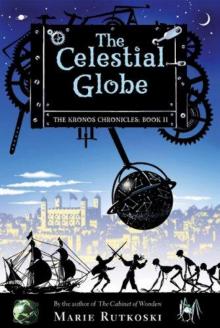 The Celestial Globe
The Celestial Globe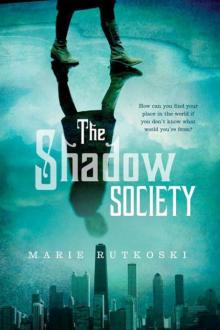 The Shadow Society
The Shadow Society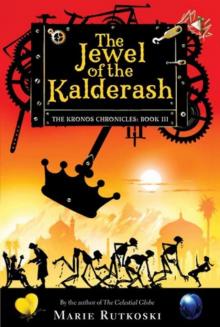 The Jewel of the Kalderash
The Jewel of the Kalderash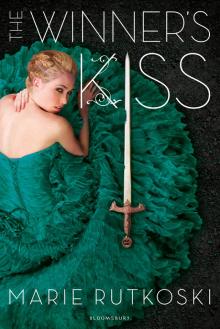 The Winner's Kiss
The Winner's Kiss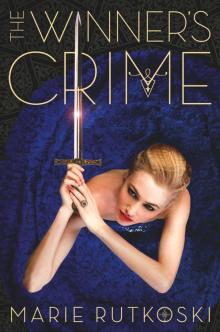 The Winner's Crime
The Winner's Crime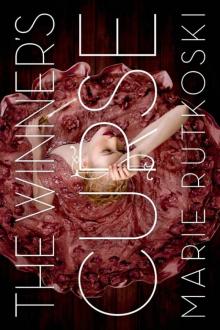 The Winner's Curse
The Winner's Curse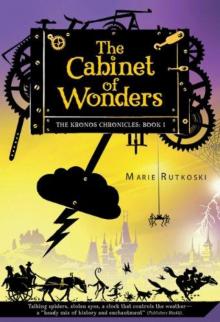 The Cabinet of Wonders
The Cabinet of Wonders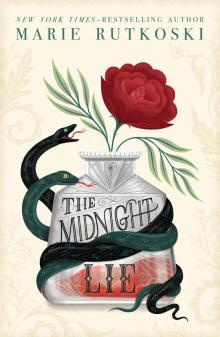 The Midnight Lie
The Midnight Lie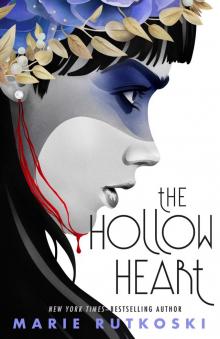 The Hollow Heart
The Hollow Heart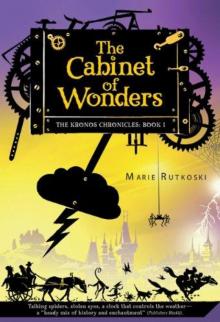 The Cabinet of Wonders: The Kronos Chronicles: Book I
The Cabinet of Wonders: The Kronos Chronicles: Book I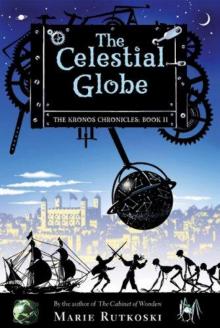 The Celestial Globe: The Kronos Chronicles: Book II
The Celestial Globe: The Kronos Chronicles: Book II